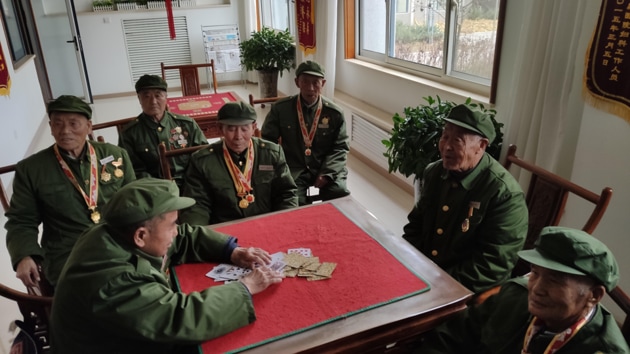An old age oasis for veterans of China’s Red Army
At least half-a-dozen of its inmates were part of the Red Army, the predecessor of the People’s Liberation Army, and fought during the civil war and the anti-Japanese war in the late 1930s and 1940s.
The Ba Yi or August 1 home for army veterans on the outskirts of China’s Yan’an city is a sprawling complex of sunlit rooms, quiet, antiseptic corridors and manicured gardens.

It is one of the oldest homes in China for army veterans – built in 1959 – and named after the day when the first communist army was commissioned on August 1, 1927.
At least half-a-dozen of its inmates were part of the Red Army, the predecessor of the People’s Liberation Army, and fought during the civil war and the anti-Japanese war in the late 1930s and 1940s.
The average age of veterans is above 70 with several over 90 years old. Among the oldest is Wang Fu, currently 101 years old.
For a centurion, Wang is surprisingly alert, ready to show his scars from old wars and share stories though he can’t hear anymore.
Wang was in his teens and at Yan’an in northwestern China when Mao Zedong marched into the city in the mid-1930s at the end of the Long March, a historic trek by communist party leaders and soldiers, which began in the southeastern part of the country.
He followed Mao to take part in the battle of Lanzhou against the Kuomintang or the Chinese Nationalist Party.
He now spends his days sitting under the sun in the garden and occasionally walking around with a little help from the nurses.
Besides giving a home to the veterans, the complex also serves as a destination for “patriotic education” where student and official delegations are invited to listen to the Communist Party of China’s (CPC) history and the battles it fought before establishing New China in 1949, the home’s director, Xue Li told a group of visiting journalists last month.
Earlier this year, China increased the pension and living subsidies for disabled veterans, Red Army veterans, like Wang, and the families of martyrs.
Xue added that more than 10 million yuan is usually spent on the home annually. For veterans, it is free.
In July, President Xi Jinping called for efforts to break new ground in the work concerning veterans’ affairs.
The situation of Wang and the others at the home is, of course, better than those Chinese army veterans who have held several protests in recent years about their low living standards and uncertain post-retirement life – some to be sentenced to jail terms for doing so.
Mostly organised quietly, these veterans managed to stage attention-grabbing protests outside the defence ministry headquarters in Beijing in recent years.
They complain that they and their families have been left to fend for themselves on meagre pensions and little government support.
“Such complaints came to a head last year (in 2018) when more than 1,000 retired soldiers, including locals and many others who rushed in from around the country, descended on government offices in the eastern city of Zhenjiang, in Jiangsu province,” the Associated Press reported earlier this year.
The protests were possibly one reason why Beijing established a ministry of veterans affairs’ in 2018.
(HT was part of a foreign journalists’ group invited by the Chinese government.)
A group of vets is seen playing cards at the Ba Yi or August 1 home for army veterans on the outskirts of China’s Yan’an city.






